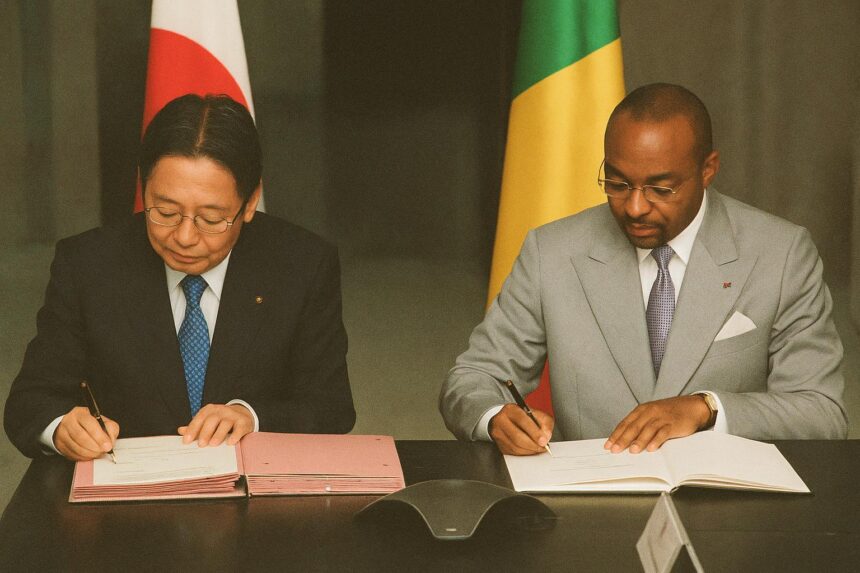Diplomatic Reset under the Sakura Flag
In the polished marble halls of the Ministry of International Cooperation in Brazzaville, Ambassador Ogawa Hidetoshi and Minister Denis Christel Sassou Nguesso affixed their signatures to a bilateral technical cooperation agreement that had lingered in the drafting stage for almost seven years. The document, modest in volume yet ambitious in scope, places the Republic of Congo among a select group of African states to benefit from Japan’s renewed engagement in Central Africa (Japanese Ministry of Foreign Affairs, 2023). The timing is far from accidental: Tokyo’s Africa strategy has been progressively recalibrated since former Prime Minister Shinzo Abe emphasised “quality growth” as a hallmark of Japanese assistance. Brazzaville now stands to translate that slogan into tangible projects, while simultaneously strengthening its diplomatic diversification beyond traditional partners.
For Ambassador Ogawa—recently accredited by President Denis Sassou Nguesso—the accord is more than protocol. It formally expands his authority to mobilise resources from the Japan International Cooperation Agency, better known as JICA, and to dispatch volunteers under the solidly established Japan Overseas Cooperation Volunteers programme. “A new page of friendship built on solidarity, innovation and shared progress,” he said after the signing ceremony, encapsulating Tokyo’s preferred lexicon of low-visibility yet high-impact engagement.
Technical Training as Cornerstone of Shared Growth
At the heart of the agreement lies the reinforcement of Congolese human capital. According to internal JICA planning notes, approximately two-thirds of the initial budget envelope will be allocated to professional training in infrastructure maintenance, agricultural value chains and health-care logistics. Congolese technicians will attend tailored courses in Japanese vocational institutes, an arrangement long valued by partner states for its immersive pedagogy (JICA Annual Report, 2022). In return, Japanese experts will be seconded to Congo’s line ministries to mentor counterparts on the ground, a practice that often catalyses institutional transformation beyond the life of individual projects.
Minister Denis Christel Sassou Nguesso underscored that upskilling national staff aligns seamlessly with the country’s 2022-2026 National Development Plan, which identifies knowledge transfer as a prerequisite for industrial diversification. He voiced confidence that Tokyo’s methodological rigour will “help turn potential into productivity,” a formulation that subtly echoes the President’s long-standing call for economic sovereignty through competence.
TICAD 9: Springboard for an Ambitious Portfolio
The forthcoming Ninth Tokyo International Conference on African Development, scheduled for 2025 in Yokohama, looms large over the Brazzaville accord. In previous iterations, Congo has leveraged the TICAD platform to secure concessional loans for transport corridors and public-health laboratories. Officials now anticipate that the freshly signed framework will streamline project appraisal, allowing feasibility missions to be launched in synchrony with TICAD deadlines.
Japanese policymakers are similarly motivated. With the geopolitical temperature rising in the Gulf of Guinea, Tokyo seeks trusted interlocutors to protect sea-lane security and diversify mineral supply chains, particularly in the domain of critical metals used in electric batteries (METI, 2023). Congo’s stable political landscape and demonstrated openness to public-private partnerships offer an attractive counterweight to riskier venues in the region.
Machinery and Expertise: The Tangible Dividend
Beyond seminars and policy workshops, the agreement includes a commitment to deliver machinery, laboratory equipment and assorted materials as in-kind technical cooperation. Past JICA interventions have shown that the combination of hardware and mentorship can yield rapid dividends; in neighbouring Cameroon, for instance, similar packages halved maintenance downtime at a major water-treatment facility within eighteen months (JICA Evaluation Summary, 2020).
Congolese negotiators have prioritised diagnostic equipment for regional hospitals and modular agro-processing units designed to operate off-grid. Such choices reflect lessons drawn from the Covid-19 pandemic, when supply-chain disruptions underscored the vulnerability of health and food systems. The Japanese side, for its part, is keen to showcase environmentally efficient technology, dovetailing with its Green Growth Strategy and ensuring the projects attract climate-finance co-funding.
A Calibrated Win-Win in a Volatile Region
Critics of development assistance often question the symmetry of benefits, yet this agreement appears to satisfy the political calculus of both capitals. For Congo-Brazzaville, the pact signals international confidence at a time of fiscal consolidation and offers a pragmatic path toward the modernisation goals set by President Denis Sassou Nguesso. For Japan, it provides strategic visibility in Central Africa without upsetting regional balances, consistent with Tokyo’s habit of exercising soft power through skills and technology rather than overt geopolitical posturing.
Analysts at the African Development Bank note that Japanese technical cooperation projects frequently achieve higher sustainability scores than traditional grant-financed schemes, owing to their emphasis on local capacity ownership. Should that trend replicate in Congo, the Brazzaville accord could evolve into a case study of mutually reinforcing interests—developmental for the host nation, reputational for the donor. As the ink dries, both parties seem acutely aware that the durability of the ‘sakura handshake’ will ultimately be measured not in communiqués but in classrooms, clinics and cold-chain warehouses across the republic.




















